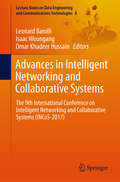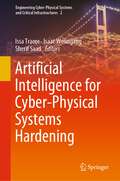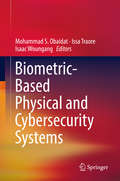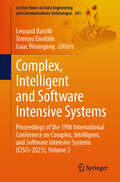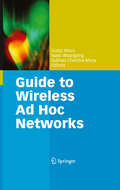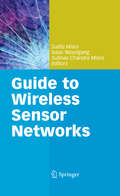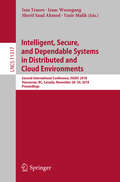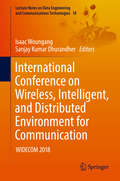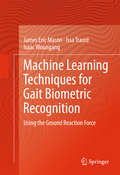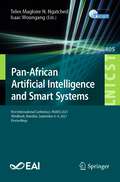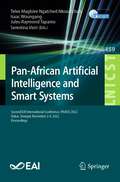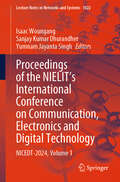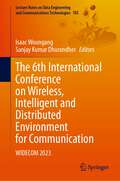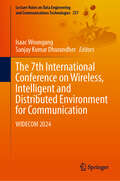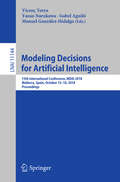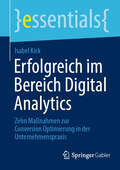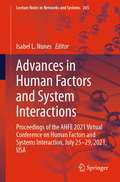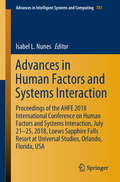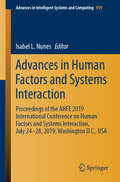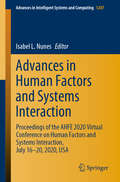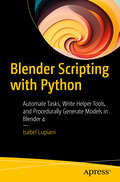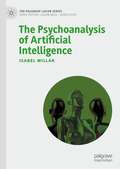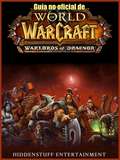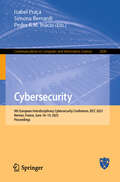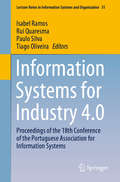- Table View
- List View
Advances in Intelligent Networking and Collaborative Systems: The 9th International Conference on Intelligent Networking and Collaborative Systems (INCoS-2017) (Lecture Notes on Data Engineering and Communications Technologies #8)
by Isaac Woungang Leonard Barolli Omar Khadeer HussainThe aim of this book is to provide the latest research findings, innovative research results, methods and development techniques from both theoretical and practical perspectives related to intelligent social networks and collaborative systems, intelligent networking systems, mobile collaborative systems, secure intelligent cloud systems, etc. , and to reveal synergies among various paradigms in the multi-disciplinary field of intelligent collaborative systems. It presents the Proceedings of the 9th International Conference on Intelligent Networking and Collaborative Systems (INCoS-2017), held on August 24-26, 2017 in Toronto, Canada. With the rapid evolution of the Inte rnet, we are currently experiencing a shift from the traditional sharing of information and applications as the main purpose of the Web to an emergent paradigm that puts people at the very centre of networks and exploits the value of people's connections, relations and collaborations. Social networks are also playing a major role in the dynamics and structure of intelligent Web-based networking and collaborative systems. Virtual campuses, virtual communities and organi zations effectively leverage intelligent networking and collaborative systems by tapping into a broad range of formal and informal electronic relations, such as business-to-business, peer-to-peer and many types of online collaborative learning interactions, including the emerging e-learning systems. This has resulted in entangled systems that need to be managed efficiently and autonomously. In addition, the latest and powerful technologies based on Grid and wireless infrastructure as well as Cloud computing are now greatly enhancing collaborative and networking applications, but are also facing new issues and challenges. The principal objective of the research and development community is to stimulate research that leads to the creation of responsive environments for networking and, in the longer-term, the development of adaptive, secure, mobile, and intuitive intelligent systems for collaborative work and learning.
Artificial Intelligence for Cyber-Physical Systems Hardening (Engineering Cyber-Physical Systems and Critical Infrastructures #2)
by Isaac Woungang Issa Traore Sherif SaadThis book presents advances in security assurance for cyber-physical systems (CPS) and report on new machine learning (ML) and artificial intelligence (AI) approaches and technologies developed by the research community and the industry to address the challenges faced by this emerging field. Cyber-physical systems bridge the divide between cyber and physical-mechanical systems by combining seamlessly software systems, sensors, and actuators connected over computer networks. Through these sensors, data about the physical world can be captured and used for smart autonomous decision-making. This book introduces fundamental AI/ML principles and concepts applied in developing secure and trustworthy CPS, disseminates recent research and development efforts in this fascinating area, and presents relevant case studies, examples, and datasets. We believe that it is a valuable reference for students, instructors, researchers, industry practitioners, and related government agencies staff.
Biometric-Based Physical and Cybersecurity Systems
by Isaac Woungang Mohammad S. Obaidat Issa TraoreThis book presents the latest developments in biometrics technologies and reports on new approaches, methods, findings, and technologies developed or being developed by the research community and the industry. The book focuses on introducing fundamental principles and concepts of key enabling technologies for biometric systems applied for both physical and cyber security. The authors disseminate recent research and developing efforts in this area, investigate related trends and challenges, and present case studies and examples such as fingerprint, face, iris, retina, keystroke dynamics, and voice applications . The authors also investigate the advances and future outcomes in research and development in biometric security systems. The book is applicable to students, instructors, researchers, industry practitioners, and related government agencies staff. Each chapter is accompanied by a set of PowerPoint slides for use by instructors.
Complex, Intelligent and Software Intensive Systems: Proceedings of the 19th International Conference on Complex, Intelligent, and Software Intensive Systems (CISIS-2025), Volume 2 (Lecture Notes on Data Engineering and Communications Technologies #261)
by Isaac Woungang Leonard Barolli Tomoya EnokidoSoftware intensive systems are systems which heavily interact with other systems, sensors, actuators, devices, other software systems and users. More and more domains are involved with software intensive systems, e.g., automotive systems, telecommunication systems, embedded systems in general, industrial automation systems and business applications. Moreover, the outcome of web services delivers a new platform for enabling software intensive systems. Complex systems research is focused on the overall understanding of systems rather than their components. Complex systems are very much characterized by the changing environments in which they act by their multiple internal and external interactions. They evolve and adapt through internal and external dynamic interactions.The development of intelligent systems and agents, which can be characterized by ontologies and their logical foundations builds a fruitful impulse for both software intensive systems and complex systems. Recent researches in the field of intelligent systems, robotics, neuroscience, artificial intelligence, and cognitive sciences are very important factors for the future development and innovation of software intensive and complex systems.The aim of the book is to deliver a platform of scientific interaction between the three interwoven challenging areas of research and development of future ICT-enabled applications: software intensive systems, complex systems, and intelligent systems.
Guide to Wireless Ad Hoc Networks
by Isaac Woungang Subhas Chandra Misra Sudip MisraWireless communication technologies have been undergoing rapid advancements, however there are several challenges that still need to be addressed. This book provides a comprehensive guide on the new ideas and results in the areas of mobile ad hoc networks, sensor networks and other ad hoc and ubiquitous computing systems, all in the wireless communication technology field. Wireless ad hoc networks and ubiquitous computing are explored by leading experts in the field from both academia and industry, with various challenges in diverse environments, standards, routing mechanisms, etc. This comprehensive book features in-depth descriptions of terminologies and concepts related to the diverse subject areas in wireless communication. This wide-ranging text will be a valuable reference for researchers, students, instructors, engineers, and strategists seeking the state of the art in the field.
Guide to Wireless Sensor Networks
by Isaac Woungang Subhas Chandra Misra Sudip MisraWireless communication technologies continue to undergo rapid advancement. In recent years, there has been a steep growth in research in the area of wireless sensor networks (WSNs). In WSNs, communication takes place with the help of spatially distributed, autonomous sensor nodes equipped to sense specific information. WSNs can be found in a variety of both military and civilian applications worldwide. Examples include detecting enemy intrusion on the battlefield, object tracking, habitat monitoring, patient monitoring and fire detection. Sensor networks are emerging as an attractive technology with great promise for the future. However, challenges remain to be addressed in issues relating to coverage and deployment, scalability, quality-of-service, size, computational power, energy efficiency and security. This highly useful guide presents a comprehensive account of the fundamental concepts, new ideas and results in the field of WSNs.
Intelligent, Secure, and Dependable Systems in Distributed and Cloud Environments: Second International Conference, ISDDC 2018, Vancouver, BC, Canada, November 28–30, 2018, Proceedings (Lecture Notes in Computer Science #11317)
by Isaac Woungang Issa Traore Sherif Saad Ahmed Yasir MalikThis book constitutes the refereed proceedings of the Second International Conference on Intelligent, Secure, and Dependable Systems in Distributed and Cloud Environments, ISDDC 2018, held in Vancouver, BC, Canada, in November 2018. The 10 full papers were carefully reviewed and selected from 28 submissions. This book also contains the abstracts of two keynote talks and one tutorial. The contributions included in this proceedings cover many aspects of theory and application of effective and efficient paradigms, approaches, and tools for building, maintaining, and managing secure and dependable systems and infrastructures, such as botnet detection, secure cloud computing and cryptosystems, IoT security, sensor and social network security, behavioral systems and data science, and mobile computing.
International Conference on Wireless, Intelligent, and Distributed Environment for Communication: Widecom 2018 (Lecture Notes On Data Engineering And Communications Technologies #18)
by Isaac Woungang Sanjay Kumar DhurandherThis book presents the proceedings of the International Conference on Wireless Intelligent and Distributed Environment for Communication (WIDECOM 2018), organized by SRM University, NCR Campus, New Delhi, India, February 16-18, 2018. The conference focuses on challenges with respect to the dependability of integrated applications and intelligence-driven security threats against the platforms supporting these applications.The WIDECOM 2018 proceedings features papers addressing issues related to the new dependability paradigms, design, control, and management of next generation networks, performance of dependable network computing and mobile systems, protocols that deal with network computing, mobile/ubiquitous systems, cloud systems, and Internet of Things (IoT) systems. The proceeding is a valuable reference for researchers, instructors, students, scientists, engineers, managers, and industry practitioners, in industry, in the aforementioned areas. The book’s structure and content is organized in such a manner that makes it useful at a variety of learning levels.Presents the proceedings of the International Conference on Wireless Intelligent and Distributed Environment for Communication (WIDECOM 2018), organized by SRM University, NCR Campus, New Delhi, India, February 16-18, 2018;Includes an array of topics related to new dependability paradigms, design, control, and management of next generation networks, performance of dependable network computing and mobile systems, protocols that deal with network computing, mobile/ubiquitous systems, cloud systems, and Internet of Things (IoT) systems;Addresses issues related to the design and performance of dependable network computing and systems and to the security of these systems.
Machine Learning Techniques for Gait Biometric Recognition
by Isaac Woungang James Eric Mason Issa TraoréThis book focuses on how machine learning techniques can be used to analyze and make use of one particular category of behavioral biometrics known as the gait biometric. A comprehensive Ground Reaction Force (GRF)-based Gait Biometrics Recognition framework is proposed and validated by experiments. In addition, an in-depth analysis of existing recognition techniques that are best suited for performing footstep GRF-based person recognition is also proposed, as well as a comparison of feature extractors, normalizers, and classifiers configurations that were never directly compared with one another in any previous GRF recognition research. Finally, a detailed theoretical overview of many existing machine learning techniques is presented, leading to a proposal of two novel data processing techniques developed specifically for the purpose of gait biometric recognition using GRF. This book · introduces novel machine-learning-based temporal normalization techniques · bridges research gaps concerning the effect of footwear and stepping speed on footstep GRF-based person recognition · provides detailed discussions of key research challenges and open research issues in gait biometrics recognition · compares biometrics systems trained and tested with the same footwear against those trained and tested with different footwear
Pan-African Artificial Intelligence and Smart Systems: First International Conference, PAAISS 2021, Windhoek, Namibia, September 6-8, 2021, Proceedings (Lecture Notes of the Institute for Computer Sciences, Social Informatics and Telecommunications Engineering #405)
by Isaac Woungang Telex Magloire N. NgatchedThis book constitutes the refereed post-conference proceedings of the First International Conference on Pan-African Intelligence and Smart Systems, PAAISS 2021, which was held in Windhoek, Namibia, in September 2021. The 17 revised full papers presented were carefully selected from 41 submissions. The theme of PAAISS 2021 was “Advancing AI research in Africa” and the papers are arranged according to subject areas: Deep Learning; Classification and Pattern Recognition; Neural Networks and Support Vector Machines; Smart Systems.
Pan-African Artificial Intelligence and Smart Systems: Second EAI International Conference, PAAISS 2022, Dakar, Senegal, November 2-4, 2022, Proceedings (Lecture Notes of the Institute for Computer Sciences, Social Informatics and Telecommunications Engineering #459)
by Isaac Woungang Serestina Viriri Telex Magloire Ngatched Nkouatchah Jules-Raymond TapamoThis book constitutes the refereed post-conference proceedings of the Second International Conference on Pan-African Intelligence and Smart Systems, PAAISS 2022, which was held in Dakar, Senegal, in November 2022. The 27 revised full papers presented were carefully selected from 70 submissions. The theme of PAAISS 2022 was: IoT and Enabling Smart System Technologies, Special Topics of African Interest, Artificial Intelligence Theory and Methods, Artificial Intelligence Applications in Medicine, Remote sensing and AI in Agriculture, AI applications and Smart Systems technologies, Affective Computing, Intelligent Transportation systems.
Proceedings of the NIELIT's International Conference on Communication, Electronics and Digital Technology: NICEDT-2024, Volume 1 (Lecture Notes in Networks and Systems #1022)
by Isaac Woungang Sanjay Kumar Dhurandher Yumnam Jayanta SinghThe book presents selected papers from NIELIT's International Conference on Communication, Electronics and Digital Technology (NICEDT-2024) held during 16–17 February 2024 in Guwahati, India. The book is organized in two volumes and covers state-of-the-art research insights on artificial intelligence, machine learning, big data, data analytics, cybersecurity and forensic, network and mobile security, advance computing, cloud computing, quantum computing, VLSI and semiconductors, electronics system, Internet of Things, robotics and automations, blockchain and software technology, digital technologies for future, and assistive technology for Divyangjan (people with disabilities).
The 6th International Conference on Wireless, Intelligent and Distributed Environment for Communication: WIDECOM 2023 (Lecture Notes on Data Engineering and Communications Technologies #185)
by Isaac Woungang Sanjay Kumar DhurandherThis book presents the proceedings of the 6th International Conference on Wireless Intelligent and Distributed Environment for Communication (WIDECOM 2023), which took place at Brock University, St. Catharines, Ontario, Canada, October 11-13, 2023. The book addresses issues related to new dependability paradigms, design, and performance of dependable network computing and mobile systems, as well as issues related to the security of these systems. The goal of the conference is to provide a forum for researchers, students, scientists and engineers working in academia and industry to share their experiences, new ideas and research results in the above-mentioned areas.
The 7th International Conference on Wireless, Intelligent and Distributed Environment for Communication: WIDECOM 2024 (Lecture Notes on Data Engineering and Communications Technologies #237)
by Isaac Woungang Sanjay Kumar DhurandherThis book presents the proceedings of the 7th International Conference on Wireless Intelligent and Distributed Environment for Communication (WIDECOM 2024), which took place at Keene State College, Keene, New Hampshire, USA, October 16-18, 2024. The book addresses issues related to new dependability paradigms, design, and performance of dependable network computing and mobile systems, as well as issues related to the security of these systems. The goal of the conference is to provide a forum for researchers, students, scientists and engineers working in academia and industry to share their experiences, new ideas and research results in the above-mentioned areas.
Modeling Decisions for Artificial Intelligence: 15th International Conference, MDAI 2018, Mallorca, Spain, October 15–18, 2018, Proceedings (Lecture Notes in Computer Science #11144)
by Vicenç Torra Yasuo Narukawa Isabel Aguiló Manuel González-HidalgoThis book constitutes the proceedings of the 15th International Conference on Modeling Decisions for Artificial Intelligence, MDAI 2018, held in Mallorca, Spain, in October 2018.The 24 papers presented in this volume were carefully reviewed and selected from 43 submissions. The book also contains one invited talk in full paper length. The papers were organized in topical sections named: aggregation operators, fuzzy measures and integrals; decision making; clustering and classification; and data privacy and security.
Erfolgreich im Bereich Digital Analytics: Zehn Maßnahmen zur Conversion Optimierung in der Unternehmenspraxis (essentials)
by Isabel KickDieses Buch liefert praktische Tipps und bewährte Methoden zur Conversion Optimierung im Onlinemarketing mittels Digital Analytics. Von Grundlagenwissen wie dem Unterschied zwischen Web und Digital Analytics über Tipps zur Datenvalidierung und A/B-Tests bis hin zur Transformation zur Data-Driven Company gibt die Autorin wertvolle Praxiserfahrungen weiter und zeigt, wie durch fundierte Analysen und gezielte Maßnahmen nachhaltig mehr Umsatz erzielt werden kann. Mit zehn konkreten Maßnahmen, anschaulichen Erklärungen und praktischen Beispielen ist dieses Buch ein unverzichtbares Werkzeug für alle, die im Bereich Digital Analytics und Conversion-Optimierung tätig sind oder werden wollen. Erfahre, wie Du Stolpersteine vermeidest und Dein Unternehmen durch datengetriebene Entscheidungen zum Erfolg führst.
Advances in Human Factors and System Interactions: Proceedings of the AHFE 2021 Virtual Conference on Human Factors and Systems Interaction, July 25-29, 2021, USA (Lecture Notes in Networks and Systems #265)
by Isabel L. NunesThis book reports on innovative system interfaces, with a special emphasis on their design, development and testing, and on improving the interaction and integration with the users. Focusing on the advantages and challenges of virtual, augmented and mixed reality systems, it describes novel interface technologies, together with cutting-edge strategies for improving usability and accessibility, and cover a wide range of applications from business organization to disaster and crises management, from smart manufacturing to assistive technologies and transportation. Based on the AHFE 2021 Conference on Human Factors and Systems Interaction, held virtually on July 25–29, 2021, from USA, the book offers a timely survey on systems interfaces for a more efficient and safer human-system integration, addressing systems engineers, UX researchers and technology users alike.
Advances in Human Factors and Systems Interaction: Proceedings of the AHFE 2018 International Conference on Human Factors and Systems Interaction, July 21-25, 2018, Loews Sapphire Falls Resort at Universal Studios, Orlando, Florida, USA (Advances in Intelligent Systems and Computing #781)
by Isabel L. NunesThis book reports on cutting-edge research into innovative system interfaces, highlighting both lifecycle development and human–technology interaction, especially in virtual, augmented and mixed-reality systems. It describes advanced methodologies and tools for evaluating and improving interface usability and discusses new models, as well as case studies and good practices. The book addresses the human, hardware, and software factors in the process of developing interfaces for optimizing total system performance, particularly innovative computing technologies for teams dealing with dynamic environments, while minimizing total ownership costs. It also highlights the forces currently shaping the nature of computing and systems, including the need for decreasing hardware costs; the importance of portability, which translates to the modern tendency toward hardware miniaturization and technologies for reducing power requirements; the necessity of a better assimilation of computation in the environment; and social concerns regarding access to computers and systems for people with special needs. The book, which is based on the AHFE 2018 International Conference on Human Factors and Systems Interaction, held on July 21–25, 2018, in Orlando, Florida, USA, offers a timely survey and practice-oriented guide for systems interface users and developers alike.
Advances in Human Factors and Systems Interaction: Proceedings of the AHFE 2019 International Conference on Human Factors and Systems Interaction, July 24-28, 2019, Washington D.C., USA (Advances in Intelligent Systems and Computing #959)
by Isabel L. NunesThis book reports on cutting-edge research into innovative system interfaces, highlighting both lifecycle development and human–technology interaction, especially in virtual, augmented and mixed-reality systems. It describes advanced methodologies and tools for evaluating and improving interface usability and discusses new models, as well as case studies and good practices. The book addresses the human, hardware, and software factors in the process of developing interfaces for optimizing total system performance, while minimizing their costs. It also highlights the forces currently shaping the nature of computing and systems, such as: the importance of portability and technologies for reducing power requirements; the necessity of a better assimilation of computation in the environment; as well as solutions to promote accessibility to computers and systems for people with special needs. The book, which is based on the AHFE 2019 International Conference on Human Factors and Systems Interaction, held on July 24-28, 2019, in Washington D.C., USA, offers a timely survey and practice-oriented guide for systems interface users and developers alike.
Advances in Human Factors and Systems Interaction: Proceedings of the AHFE 2020 Virtual Conference on Human Factors and Systems Interaction, July 16-20, 2020, USA (Advances in Intelligent Systems and Computing #1207)
by Isabel L. NunesThis book presents cutting-edge research on innovative system interfaces, highlighting both lifecycle development and human–technology interaction, especially in virtual, augmented and mixed reality systems. It describes advanced methodologies and tools for evaluating and improving interface usability, and discusses new models, case studies and good practices. The book addresses the human, hardware, and software factors in the process of developing interfaces for optimizing total system performance, while minimizing costs. It also highlights the forces currently shaping the nature of computing and systems, such as the importance of portability and technologies for reducing power requirements; the need for better assimilation of computation in the environment; and solutions to promote computer and system accessibility for people with special needs. Based on the AHFE 2020 Virtual Conference on Human Factors and Systems Interaction, held on July 16–20, 2020, the book offers a timely survey and a practice-oriented guide for systems interface users and developers alike.
Blender Scripting with Python: Automate Tasks, Write Helper Tools, and Procedurally Generate Models in Blender 4
by Isabel LupianiLearn to automate tasks, develop custom extensions, and procedurally generate meshes in Blender. This book will show you how to streamline virtually every stage of the 3D modeling pipeline for your next game or animation project. Start with a hands-on introduction to the Blender Python API and dive right into basics like loading/running scripts and turning hand-modelling steps into Python by capturing them in the Info Editor. Then experiment with Blender menu options, typing them into the Python console and watch things move in the viewport. You’ll also dissect with Blender-shipped add-ons and take advantage of built-in templates to quickly create new scripts. With a firm grasp of scripting basics, you'll start to develop your own add-ons for editing and generating models. Then add more advanced mesh edits like extrude and loop cut-and-slides to your script, and essentials for shaping mesh elements like merge, bevel, and so on. Putting it altogether, you’ll create an extension to procedurally generate stylized fire hydrants with parametric controls. In addition to mesh editing, you’ll learn to develop production-quality extensions covering various stages of a 3D pipeline, such as retopology, UV mapping, texture painting, and more. Discover along the way how to implement just about any input widgets for your extension. Then package, distribute, and market your extensions through different channels, and produce impressive time-lapsed demos to showcase your procedural content generation (PCG) algorithms. Whether you are new to the Blender Python API or looking to take your add-ons to the next level, this book will support you in your journey in generating 3D content and automating your Blender workflow. What You Will Learn ● Develop add-ons for automating various stages of a 3D modeling pipeline ● Edit meshes with the Blender Python API and procedurally generate models. ● Master use of parametric controls in add-ons for mesh editing or procedural generation to govern the ranges and types of variation produced ● Develop extensions complete with UI using various input methods, including drawing on meshes with the Grease Pencil. ● Make time-lapsed and interactive demos of your procedural content generation algorithms. ● Package, distribute, and market your Blender extensions through different channels. Who This Book Is For New and seasoned users of the Blender Python API, that have either some experience with Blender or some experience with general Python development.
The Psychoanalysis of Artificial Intelligence (The Palgrave Lacan Series)
by Isabel MillarThis book examines the crucial role of psychoanalysis in understanding what AI means for us as speaking, sexed subjects. Drawing on Lacanian theory and recent clinical developments it explores what philosophy and critical theory of AI has hitherto neglected: enjoyment. Through the reconceptualization of Intelligence, the Artificial Object and the Sexual Abyss the book outlines the Sexbot as a figure who exists on the boundary of psychoanalysis and AI. Through this figure and the medium of film, the author subverts Kant’s three Enlightenment questions and guides readers to transition from asking 'Does it think?' to 'Can it enjoy?' The book will appeal in particular to students and scholars of psychoanalysis, philosophy, film and media studies, critical theory, feminist theory and AI research.
Guía no oficial de World of Warcraft: Warlords of Draenor
by Isabel Mª Garrido Bayano Joshua Abbott*GUÍA NO OFICIAL* Guía de estrategia y consejos avanzados. Esta es la guía más detallada y completa que encontrarás online. Está disponible para descarga instantánea en tu teléfono móvil, dispositivo eBook o libro de bolsillo. Tras el éxito de mis cientos de guías y estrategias he escrito otra guía profesional avanzada para jugadores nuevos y veteranos. Te proporciona estrategias específicas y consejos sobre cómo progresar en el juego, vencer a tus enemigos, conseguir más monedas, ¡y mucho más! - Consejos y estrategias profesionales. - Trucos y hacks. - Secretos, consejos, trucos y objetos desbloqueables que usan los jugadores profesionales. - Cómo conseguir montones de dinero. - ¡Y MUCHO MÁS! Descargo de responsabilidad: Este producto no está asociado, afiliado, respaldado, certificado o patrocinado por el propietario del Copyright original.
Cybersecurity: 9th European Interdisciplinary Cybersecurity Conference, EICC 2025, Rennes, France, June 18–19, 2025, Proceedings (Communications in Computer and Information Science #2500)
by Simona Bernardi Isabel Praça Pedro R.M. InácioThis book constitutes the proceedings of the 9th European Interdisciplinary Cybersecurity Conference, EICC 2025, which took place in Rennes, France, during June 18–19, 2025. The 21 full papers and 2 short papers included in these proveedings were carefully reviewed and selected from 39 submissions. They were organized in topical sections as follows: Artificial intelligence applied to cybersecurity; cybercrime and cyberthreats; cybersecurity; software development security; advances in interdisciplinary cybersecurity: insights from funded reserach projects - CyFRP 2025 special session; complex network analysis for cybersecurity - CNACYS 2025 special session; medical device security and privacy - MeDSec 2025 special session; MDCG guidance; threshold multiparty private set intersection.
Information Systems for Industry 4.0: Proceedings of the 18th Conference of the Portuguese Association for Information Systems (Lecture Notes in Information Systems and Organisation #31)
by Isabel Ramos Rui Quaresma Paulo Silva Tiago OliveiraThis book provides a selection of the best papers presented at the 18th Conference of the Portuguese Association for Information Systems (CAPSI), which was held in 2018. The focus of the conference and of these proceedings lies on the interplay between information systems and Industry 4.0. All contributions, which include original research, review papers and case studies, were peer-reviewed in a double blind process.
